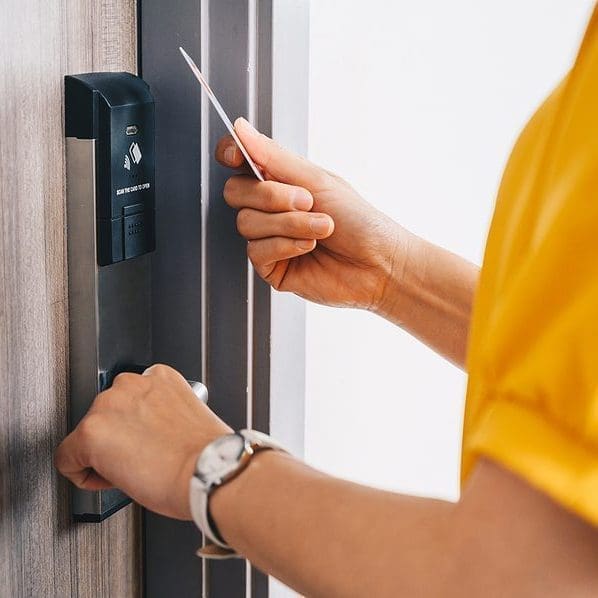I would like to join in the current discussion about the trend of hotels to no longer require staff to wear name tags. I have seen this firsthand, and I suggest this trend lessens a quality guest experience. From my point of view, this trend also engenders certain security problems.
From purely a security aspect, name tags are important and I would like to highlight a few concerns where I see there are potential risks:
- I think it is important that staff can clearly be distinguished from guests. This is crucial in the event of any emergency. Management commonly wears suits, but so do business guests. This is why business people have been mistaken as management by guests. While general staff in uniform is a big help, name tags completes identification and adds a personal touch. Also staff – particularly new staff – must be able to identify colleagues quickly and easily in order to work together as a team and to get assistance when they need it.
- In emergency situations, law-enforcement must be able to identify staff members.
- Some hotels use security guards provided by an external company. The guards often have no detailed knowledge about the hotel product and can’t answer typical questions, such as opening hours, etc. That’s okay, as long as they are able to refer the guest to a hotel employee who can provide the information. To avoid confusion, I always recommend it says ‘Security’ on the guard’s name tag. If we stop using name tags, then guests will start wondering why this hotel employee in the lobby – the security guard in this case – can’t answer their questions. It will leave the guest with a very bad impression. If you want to avoid a guest posting a negative comment about your hotel on Trip Advisor, et al. like the following: “incompetent doorman in this 5 star hotel could not even tell us when breakfast starts…” then I suggest a rethink about name tags.
If I am a guest in your hotel and I see a man in a suit walking down my bedroom corridor, checking every door to see if it is locked, and he is not wearing a name tag, I would have no hesitation in reporting him as a suspicious person to reception/switchboard immediately. He could be anyone who has walked into the hotel off the street. As a guest I could not possibly know he is the Duty Manager on a security walk. For my own safety, I also would not even try to stop him or ask him questions to find out if he belongs to a hotel.
Hotels are putting their guests into these awkward situations because managers are not wearing name tags either. The reason I am mentioning this example is because criminals who would like to break into a hotel room will behave and try to look as if they work at the hotel, hence the suit in some cases. Ask yourself: how can a non-staff member (your guests, but also your vendors) identify an intruder/criminal in your hotel while this casual trend of no name tags continues?
A name tag is part of the verification process and an important security standard during high profile stays. The last thing diplomats and VIPs want is to be served by a person who cannot be identified as a hotel employee. Imagine, in a 5 star hotel, a young man in a nice suit with no name tag knocks on the bedroom door of a celebrity in the evening and says, “Good evening Madam, this is your turn down service, may I come in?” The guest cannot know whether or not the man is a criminal pretending to be the manager. If she is robbed or worse, it would be disastrous for her and for the hotel brand. Failures like this are usually given plenty of attention by the media.
I have given this example to illustrate the risks guests are unknowingly exposed to. It shows the potential consequences when guests are not able to identify a member of the staff. I am not saying it will happen. What I am saying is that the risk exists because nothing is stopping it from happening, and it is more likely to occur when hotels do not use name tags.
Ingredients to make a crime
Keep in mind, it always requires three things to commit a crime:
1. Someone who wants to commit a crime
2. A victim
3. No one to intervene.
If one of the three elements is missing, then you are more or less on the safe side. But as soon as all 3 factors line up, then the risk factor changes to the status “very likely”.
The apprentice
Twenty years ago when I was an apprentice, I remember we were always told by the Maitre de Hotel to wear our name tag for quality purposes. ‘Apprentice’ was written underneath my name. When we, the apprentices, gained our first experience as service staff and were by no means fully trained yet, the name tag signalled that we were still a staff member in training, and in most cases guests had sympathy and excused little mistakes.
From a marketing point of view, it reflected also that the hotel invested in young people, which certainly provided a positive image. Without the apprentice name tag, guests would not know if a staff member was still in training or not. Wearing our name tag protected us from high expectations of guests. Guests found it easier to use our name when having a conversation. It also helped us to identify ourselves with our new job.
When I was a student in hotel management school we often worked part time as waiters catering at weddings and corporate events. Because we were external staff, name tags were mandatory so all the other staff were able to identify us as part of the team. It was also used to get access to the VIP section, etc. Security guards identified the staff with the name tags. I am not so sure how they would have done this without them. It would have certainly caused some confusion. One time, I remember a number of external staff were sent home without pay because they had forgotten their name tags.
Personally, I see no benefit in not using name tags. How much money would it save? On the other hand, how much could a hotel lose in guest satisfaction? I have already seen it produce unwanted guest frustration. Not using name tags lowers the quality of service and contributes to unwelcome risks.
About the author
His hotel experience includes rooms division management, pre-opening, fire, health & safety, risk management & cost control. He has worked for leading hotel brands in Munich, Frankfurt, Bremen, Berlin, Cork, Edinburgh and Doha in the Middle East.
He graduated in 2002 as a Hotel Management Consultant at the Steigenberger Hotel Management School. He gained valuable experience as a Cost Controller at the Sheraton Hotel & Towers at Frankfurt Airport. He worked three years in Ireland where he built on his experience as a former volunteer fire officer and became a qualified IOSH Health & Safety Officer. He effectively combined the field of Health & Safety with his Assistant Manager positions.
Stefan now consults to hotels to implement innovative and affordable strategies to raise their level of security to meet growing global demands.































